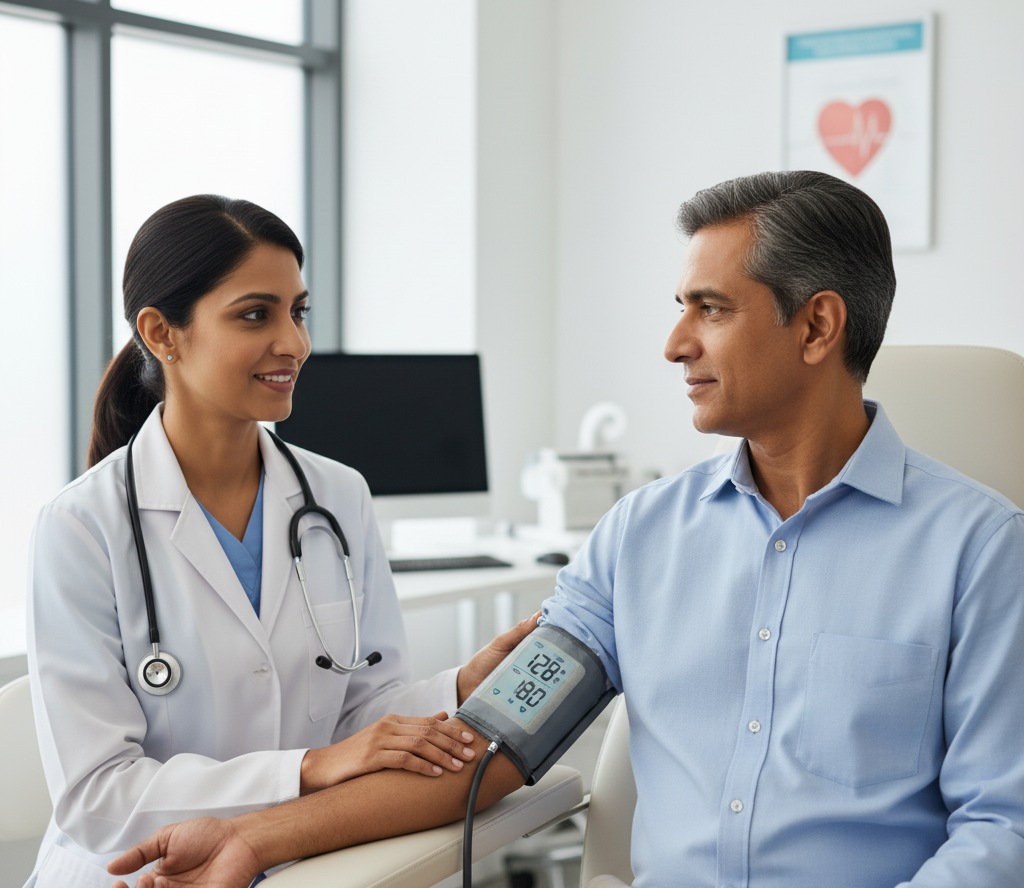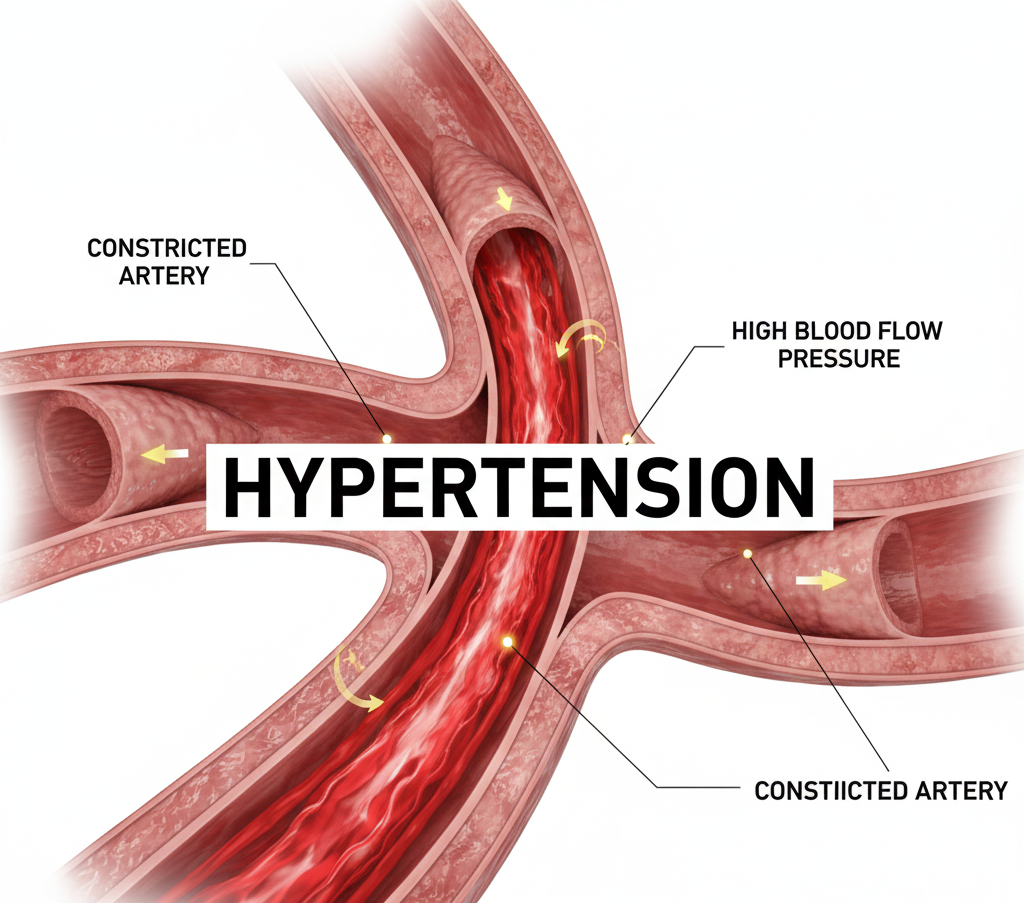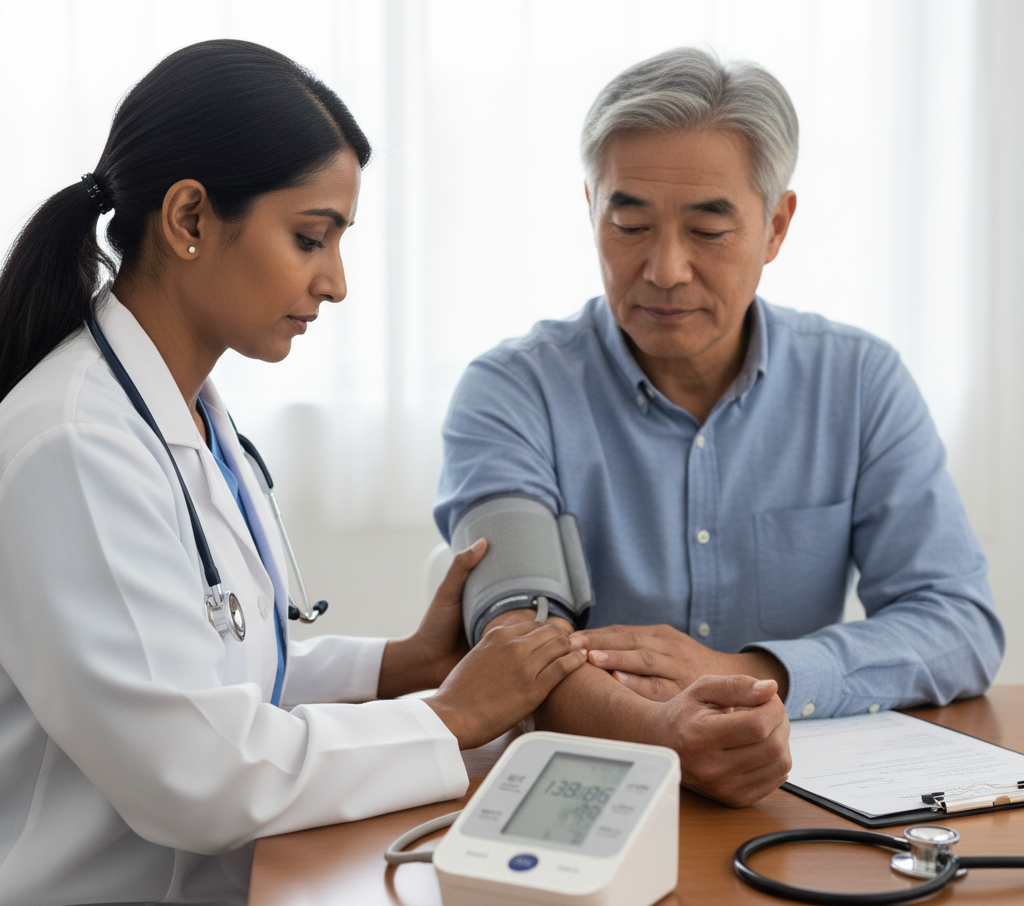Introduction
High blood pressure — often called the “silent killer” — is one of the leading causes of heart disease, stroke, and kidney failure worldwide. According to the World Health Organization (WHO), more than 1.2 billion people globally live with hypertension, and nearly half of them are unaware of it.
In India, the number is equally alarming — one in three adults suffers from high blood pressure. Yet, awareness, diagnosis, and control rates remain dangerously low. Uncontrolled hypertension silently damages your arteries, heart, brain, and kidneys, leading to life-threatening complications.
This blog explains the causes, symptoms, and management of high blood pressure, along with practical lifestyle tips to keep your heart healthy.

What Is High Blood Pressure?
High blood pressure, or hypertension, occurs when the force of blood pushing against your artery walls is consistently too high. Blood pressure readings are expressed as two numbers — systolic (top) and diastolic (bottom) — measured in millimeters of mercury (mmHg).
| Category | Systolic (mmHg) | Diastolic (mmHg) |
|---|---|---|
| Normal | <120 | <80 |
| Elevated | 120–129 | <80 |
| Stage 1 Hypertension | 130–139 | 80–89 |
| Stage 2 Hypertension | ≥140 | ≥90 |
| Hypertensive Crisis | >180 | >120 |
When blood pressure remains above normal over time, it puts strain on blood vessels and vital organs.

Causes of High Blood Pressure
High blood pressure can be primary (essential) or secondary:
1. Primary Hypertension
This type develops gradually over years due to a combination of:
-
Genetic factors
-
Unhealthy diet (excess salt and fat)
-
Lack of physical activity
-
Stress and poor sleep
-
Obesity and aging
2. Secondary Hypertension
Triggered by underlying health issues like:
-
Kidney disease
-
Thyroid disorders
-
Hormonal imbalances
-
Use of birth control pills or steroids
-
Sleep apnea
Symptoms of High Blood Pressure
High blood pressure often shows no obvious symptoms, which is why it’s called a silent killer. However, when extremely elevated, it may cause:
-
Severe headache
-
Dizziness or blurred vision
-
Chest pain
-
Fatigue
-
Shortness of breath
-
Nosebleeds
Regular monitoring is the only reliable way to detect hypertension early.
Read Also: How To Manage Stress And Anxiety: A Complete Guide For Mental Health
Diagnosis and Tests
Your doctor will confirm high blood pressure using:
-
Blood Pressure Measurement: Taken on two or more occasions.
-
Blood Tests: To check cholesterol, blood sugar, and kidney function.
-
ECG or Echocardiogram: To assess heart damage.
-
Urine Tests: To detect protein or kidney issues.
Tip: Use a home blood pressure monitor to keep track regularly, especially if you are above 40 or have a family history of hypertension.

Complications of Uncontrolled Hypertension
If left unmanaged, high blood pressure can lead to:
-
Stroke
-
Kidney failure
-
Aneurysm (blood vessel bulge)
-
Vision loss
-
Cognitive decline or dementia
Treatment and Management
1. Lifestyle Changes
The first line of defence is modifying your habits:
-
Reduce salt intake – limit to less than 5g/day.
-
Eat fruits and vegetables – rich in potassium, fiber, and antioxidants.
-
Exercise regularly – 30–45 minutes of brisk walking or yoga daily.
-
Quit smoking and alcohol – both raise blood pressure and damage arteries.
-
Maintain healthy weight – even a 5–10% weight loss lowers pressure.
-
Manage stress – through meditation, deep breathing, and adequate sleep.
2. Medications
If lifestyle changes aren’t enough, doctors may prescribe:
-
ACE inhibitors (e.g., enalapril)
-
ARBs (e.g., losartan)
-
Calcium channel blockers (e.g., amlodipine)
-
Diuretics (e.g., hydrochlorothiazide)
⚠️ Note: Medication choice and dosage depend on your health condition and must be prescribed by a doctor.
Hypertension in India: A Growing Concern
-
Around 220 million Indians live with hypertension.
-
Only 45% are diagnosed, and less than 20% have their BP under control.
-
Urban lifestyle, stress, junk food, and sedentary habits are key contributors.
Community screening, awareness programs, and easy access to healthcare can significantly reduce risks.
Prevention Tips for High Blood Pressure
-
Get your BP checked at least once every 6 months.
-
Maintain a balanced, low-salt diet.
-
Engage in physical activity daily.
-
Stay hydrated (8–10 glasses of water per day).
-
Avoid excessive caffeine.
-
Sleep for 7–8 hours nightly.
-
Manage emotional stress effectively.
When to See a Doctor
Consult a physician immediately if:
-
Your blood pressure is consistently above 140/90 mmHg.
-
You experience chest pain, headaches, or vision changes.
-
You’re pregnant and have high BP readings.
Quickobook can help you book a nearby general physician or cardiologist online for early diagnosis and treatment.
Conclusion
Uncontrolled high blood pressure may not show symptoms, but its impact can be deadly. The good news is — hypertension is preventable and manageable. With timely detection, lifestyle changes, and proper medical care, you can lead a long and healthy life.
Take charge today — measure your BP, eat mindfully, move daily, and consult a doctor through Quickobook for expert guidance.









Comments (0)
No comments yet. Be the first to share your thoughts!
Leave a Comment